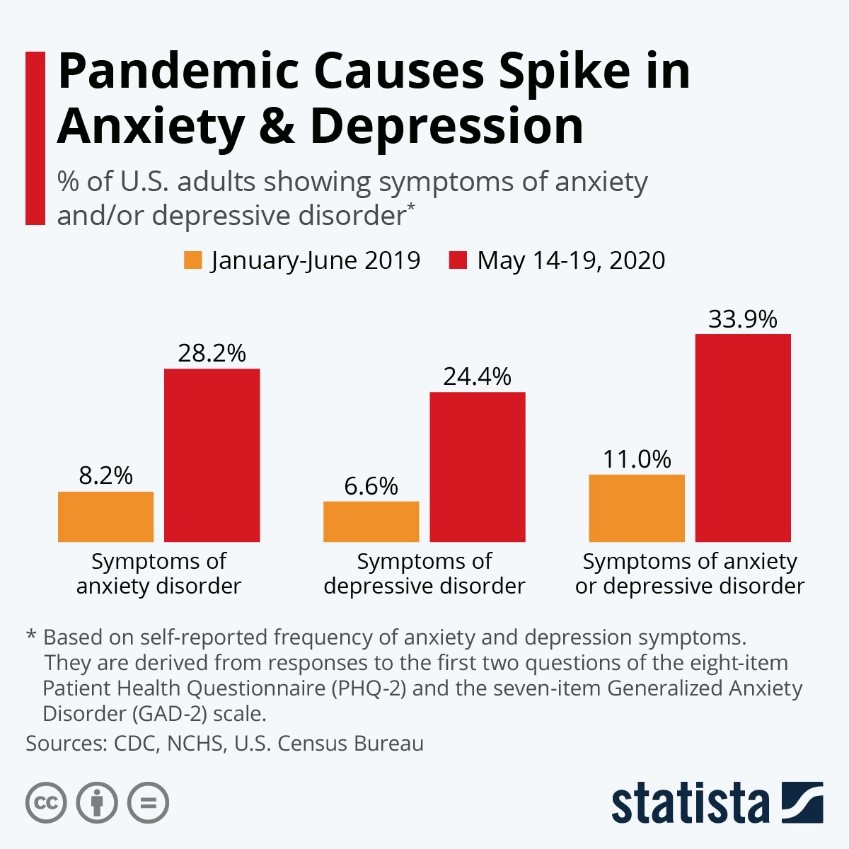HFYH: How to Deal with Anxiety from Coronavirus

For many, Coronavirus (COVID-19) has added a new level of stress and anxiety to their already stressful daily lives. Many have been out of work, usually without pay, compounding stress and anxiety related to basic needs like food, medicine, rent or mortgage payments. For those parents who are fortunate to be able to perform their job from home, they now have the added role of “at home teacher” with schools and camps closed due to Coronavirus. Mostly everyone has felt the impact of COVID-19 and are trying to adjust to their “new normal”.
A recent study based on the Household Pulse Survey highlights an alarming number of U.S. adults showing symptoms of anxiety and/or depression. The survey asked a total of 119,897 Americans about their mental health between May 14 and 19, 2020 and asked them to report how often they have felt down, depressed, hopeless or anxious in the last week. The survey also questioned how often Americans have been unable to stop worrying or shown little interest or pleasure in doing things – all symptoms that have been shown to be associated with diagnoses of generalized anxiety disorder or major depressive disorder. The graph below presents the results with the full story available at Statista.com.
 Faced with a crisis like Coronavirus, it is natural for people to feel anxiety. Anxiety is a normal emotion that alerts us to pay attention so we can protect ourselves. But when the anxiety overwhelms us, it sometimes can do more harm than good.
Faced with a crisis like Coronavirus, it is natural for people to feel anxiety. Anxiety is a normal emotion that alerts us to pay attention so we can protect ourselves. But when the anxiety overwhelms us, it sometimes can do more harm than good.
Anxiety that overwhelms us can make it a challenge to deal with the new stress that we face. However, there are steps we can all take to cope with anxiety and give us a sense of control even during these uncertain times.
“When you feel anxious, take a moment to recognize the emotion and accept it as a normal feeling, which occurs to all of us when things are scary or uncertain,” said Adriana Lequerica Ziemba, PsyD, a psychologist with the C. L. Brumback Primary Care Clinics. “Engage in focusing on positive things, thoughts, or actions, as this can bring you into the present moment, and calm you. An example of a calming positive action is ‘belly breathing’.”
There are many techniques that we can all following to provide us with a sense of control during these uncertain times. Try practicing gratitude. Noticing what we're grateful for can be a powerful remedy to anxiety. Showing gratitude can benefit your mood and your health. Sharing a simple heartfelt thank you and making a list of what you're grateful for are both great ways to practice gratitude.
Being active and getting outside are excellent things to do during these times. Going for walks can give you a moment to reconnect with nature and the exercise can relax you. Just a few minutes spent appreciating nature can lower anxiety and blood pressure, raise emotional well-being, and remind us we are part of something bigger than ourselves. Exercise also can help to boost the body's immune system. If you can't get outside to exercise, try an online fitness class.
“Other tips I share include the importance of being physically distanced, yet socially connected, by staying in touch with friends and family by phone or video chat,” added Dr. Lequerica Ziemba. “Lastly, reach out for help when you need it. Most behavioral health providers like those at the C. L. Brumback Primary Care Clinics offer telehealth visits from your smart phone or laptop.”